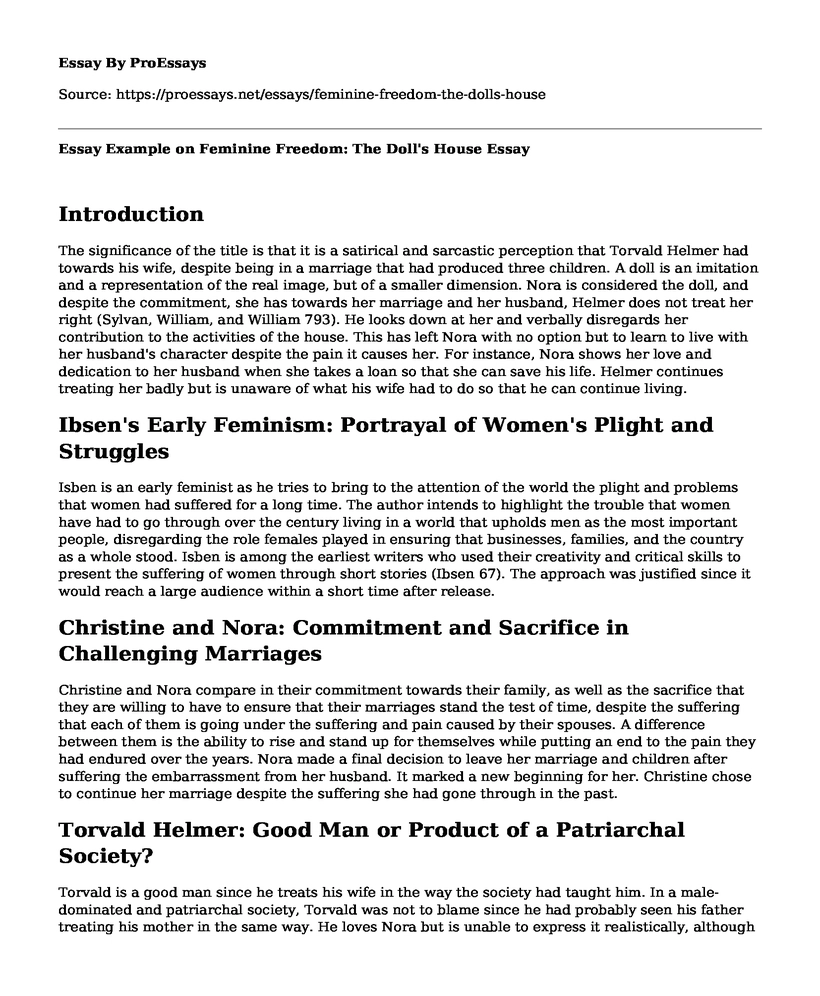Introduction
The significance of the title is that it is a satirical and sarcastic perception that Torvald Helmer had towards his wife, despite being in a marriage that had produced three children. A doll is an imitation and a representation of the real image, but of a smaller dimension. Nora is considered the doll, and despite the commitment, she has towards her marriage and her husband, Helmer does not treat her right (Sylvan, William, and William 793). He looks down at her and verbally disregards her contribution to the activities of the house. This has left Nora with no option but to learn to live with her husband's character despite the pain it causes her. For instance, Nora shows her love and dedication to her husband when she takes a loan so that she can save his life. Helmer continues treating her badly but is unaware of what his wife had to do so that he can continue living.
Ibsen's Early Feminism: Portrayal of Women's Plight and Struggles
Isben is an early feminist as he tries to bring to the attention of the world the plight and problems that women had suffered for a long time. The author intends to highlight the trouble that women have had to go through over the century living in a world that upholds men as the most important people, disregarding the role females played in ensuring that businesses, families, and the country as a whole stood. Isben is among the earliest writers who used their creativity and critical skills to present the suffering of women through short stories (Ibsen 67). The approach was justified since it would reach a large audience within a short time after release.
Christine and Nora: Commitment and Sacrifice in Challenging Marriages
Christine and Nora compare in their commitment towards their family, as well as the sacrifice that they are willing to have to ensure that their marriages stand the test of time, despite the suffering that each of them is going under the suffering and pain caused by their spouses. A difference between them is the ability to rise and stand up for themselves while putting an end to the pain they had endured over the years. Nora made a final decision to leave her marriage and children after suffering the embarrassment from her husband. It marked a new beginning for her. Christine chose to continue her marriage despite the suffering she had gone through in the past.
Torvald Helmer: Good Man or Product of a Patriarchal Society?
Torvald is a good man since he treats his wife in the way the society had taught him. In a male-dominated and patriarchal society, Torvald was not to blame since he had probably seen his father treating his mother in the same way. He loves Nora but is unable to express it realistically, although he continues to disrespect her by engaging her in physical fights. Business-wise, Torvald is not a good man since he fires Krogstad because of the hatred he had towards him. Krogstad is an immoral man since he blackmails Nora so that he can get back at Torvald. Dr. Rank helps the warring parties to find common ground to communicate with each other.
Conclusion
I feel that Nora is justified abandoning her children as she walks out of her marriage. Reflecting on the kind of life she had lived, she urgently needed the break, and it was also a chance for her to start life afresh by understanding the kind of man that should never go near her in her future relationships (Goldman 6). In addition, a father is responsible for his children as Nora had gotten married without a child, and even leaving, she had to go without one.
Works Cited
"Ibsen, Henrik." The biography Channel Website. 24 Jul 2013, 09:16.
Goldman, Emma. "The Scandinavian Drama: Henrik Ibsen 'A Doll's House.' "The Social Significance of the Modern Drama. Web. 24 Jul 2013.
Ibsen, Henrik. "A Doll's House." Literature for composition. Ed.
Sylvan Barnet, William Burto, and William E. Cain. 9th Edition. New York: Longman, 2010. 792-841. Print.
Cite this page
Essay Example on Feminine Freedom: The Doll's House. (2022, May 13). Retrieved from https://proessays.net/essays/feminine-freedom-the-dolls-house
If you are the original author of this essay and no longer wish to have it published on the ProEssays website, please click below to request its removal:
- A Literary Essay Example on The Odyssey by Homer
- American Civil War in William Faulkner's A Rose for Emily
- Drama Analysis: Death of a Salesman
- Shakespeare's Macbeth and Ridley's Gladiator Comparative Essay
- Essay Sample on Literary Devices
- Paper Example on Comparing Motifs in A Haunted House & The Jolly Corner
- The Theme of Blindness in the "Cathedral" by Raymond - Essay Example







